News
Nigerian Lawmaker Onwusibe Denies Bribery Claims, Challenges Binance to Face the Law

By Gloria Ikibah
Chairman House of Representatives Committee on Financial Crimes, Rep. Ginger Obinna Onwusibe, has firmly denied bribery allegations made against him by Binance Senior Executive Officer, Tigran Gambaryan, describing the claims as false and an attempt to tarnish his image.
The dispute began when Gambaryan accused Onwusibe and his committee of demanding bribes during an investigation into Binance’s activities in Nigeria. The allegations, widely shared on social media and reported by international media like NPR and Wired, portrayed Binance executives as victims of harassment.
According to Rep. Onwusibe, he initially chose to remain silent, as the matter was already in court. However, he has decided to respond publicly due to the backlash and what he called an “unfair attack” on his person, his political party (Labour Party), and his Igbo ethnic group.
Onwusibe explained that his committee started investigating Binance after receiving a petition from the Empowerment for Unemployed Youth Initiative. The group accused Binance of financial crimes that threatened Nigeria’s economy. The committee invited Binance CEO, Richard Teng, for a public hearing on January 10, 2024.
Before the hearing, Binance requested a private meeting to understand the allegations. On January 8, 2024, three committee members and a clerk met with Binance’s legal team at the National Assembly. Onwusibe, who had other official engagements, did not attend. He stressed that the meeting was professional and no bribe was requested.
Despite promising to attend the public hearing, Binance’s CEO, Richard Teng, failed to show up several times, sending lawyers to represent him instead. The committee postponed the hearing multiple times, but no senior Binance official appeared, raising concerns about the company’s willingness to cooperate.
The conflict worsened when Binance’s CEO, Richard Teng, published a blog post on May 7, 2024, accusing Onwusibe of corruption. The post also revealed that Binance executives were under investigation by security agencies, including the DSS and the Office of the National Security Adviser (ONSA).
Onwusibe, calling the blog post defamatory, instructed his lawyer, Nnamdi U. Nwokocha Ahaaiwe, to demand an apology and compensation from Binance. Binance refused to comply. On September 18, 2024, Onwusibe filed a lawsuit against Binance and Teng at the High Court of the Federal Capital Territory, seeking an apology, a retraction, and $3 billion in damages. The case, which began on January 22, 2025, will resume on February 19, 2025.
Onwusibe dismissed Gambaryan’s latest bribery claims as a distraction from Binance’s legal troubles. He stated that his committee worked independently and never collaborated with agencies like the DSS, ONSA, SEC, CBN, EFCC, or NFIU in the legislative probe.
He also highlighted Binance’s global legal issues, such as the U.S. conviction of its founder, Changpeng Zhao, for money laundering, and regulatory fines in countries like Canada, India, and Uzbekistan.
Onwusibe expressed disappointment that many Nigerians believed Binance’s narrative without checking the facts. He said the false accusations had not only damaged his reputation but also targeted his political party and ethnic group.
Despite this, Onwusibe remains determined to clear his name. He vowed to pursue his lawsuit to the end and accused Binance of using media blackmail to avoid accountability. He also referenced reports that one Binance executive fled from Nigerian custody, further proving, in his view, that the company was acting in bad faith.
Onwusibe stressed that Binance should face its case in court and stop using false accusations to cover up its actions. He assured Nigerians that the committee acted lawfully and that justice would prevail.
News
Mbah mourns ,says Christian Chukwu was a ‘football icon’
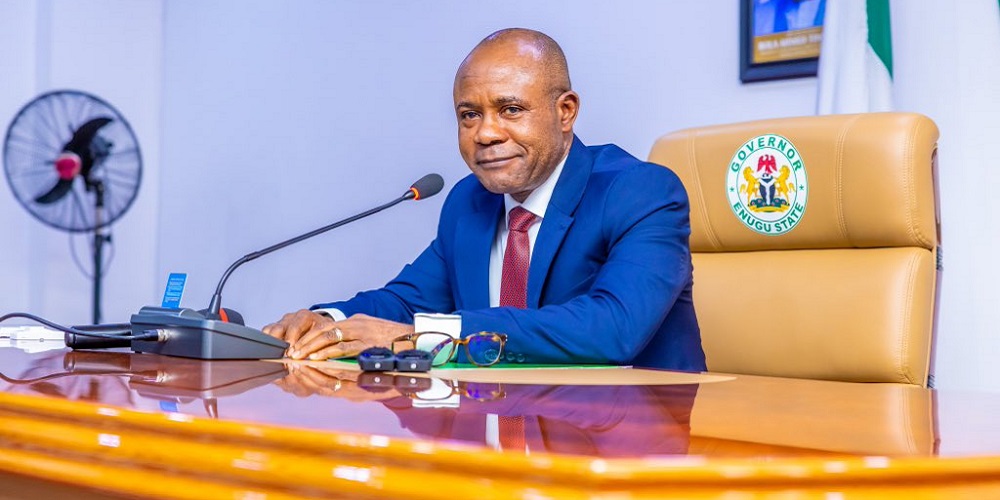
By Kayode Sanni-Arewa
Enugu Governor Peter Mbah has expressed deep grief over the passing away of former Super Eagles skipper and coach, Christian Chukwu, describing him as a football icon, titan, and phenomenon.
Reacting to the development on Saturday Mbah said: “I received with a deep sense of loss the passing away of Chairman Christian Chukwu. It is a personal loss to us as Ndi Enugu, his home state, and indeed to Nigeria as a nation and Africa as a continent.
“Christian Chukwu was a national icon, a football titan, field marshal, and phenomenon. His exploits as a footballer united the country across ethnic divides and creed.
He was patriotism personified, serving the nation and Africa unreservedly both as a player and coach of the highly successful Rangers International Football Club of Enugu and Super Eagles of Nigeria, which he captained to victory as Green Eagles at the 1980 Africa Cup of Nations, AFCON. He also coached the Harambee Stars, Kenya’s senior male national team, among others.
“Chairman, as he was fondly called, gave his all not only to the nation but to the rest of Africa. He wrote his name in gold in the annals of the history of Nigerian and African football.
Our dear legend has gone the way of all mortals, but the fond memories and the pride he gave Ndi Igbo and Nigeria as a whole will be cherished forever.
“My heart goes out to his family, Ndi Enugu, the Nigerian sports community and the entire nation over this irreplaceable loss. May the good Lord grant his soul eternal repose.”
News
Just in: Boko Haram IED Blast Kills Seven Along Maiduguri-Damboa Road

By Kayode Sanni-Arewa
No fewer than seven people lost their lives on Saturday following the detonation of an Improvised Explosive Device (IED) planted by Boko Haram terrorists in Borno State.
The deadly incident occurred along the Maiduguri-Damboa Road, a notorious route that cuts through the Sambisa Forest—an area long plagued by insurgent activities.
The victims were part of a convoy of vehicles being escorted by the military from Damboa to Maiduguri.
According to eyewitness accounts and local sources, the explosion struck as the convoy—organized to provide safe passage through the volatile region—was underway. Several other passengers sustained varying degrees of injuries and were rushed to a hospital in Maiduguri for urgent treatment.
The Maiduguri-Damboa Road serves as a vital link between the state capital and several local government areas in southern Borno, including Chibok and Gwoza.
For years, the route remained closed to civilian traffic due to persistent terrorist threats. However, under the administration of Governor Babagana Zulum, the road was reopened, with military escorts deployed to accompany travelers twice weekly after clearing the area for explosives.
Saturday’s attack raises fresh concerns about the safety of the corridor, despite consistent military presence. The blast also comes just days after Governor Zulum publicly raised alarm over renewed Boko Haram activity in the state, highlighting the persistent threat the group poses to peace and development in the region.
Authorities are yet to release an official statement on the incident, while investigations and security operations in the area continue.
News
Insecurity: Criminals Cart Away NSA Ribadu’s Office Hilux During Juma’at Prayer In Abuja
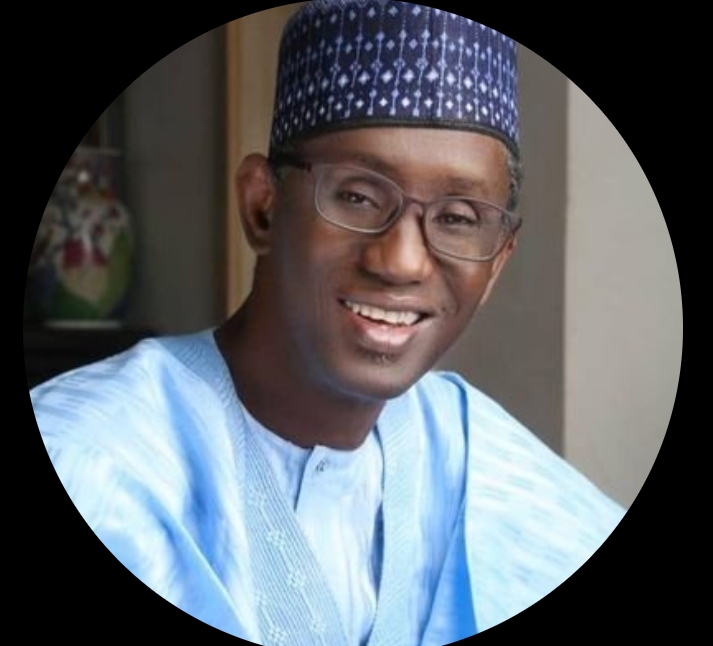
By Kayode Sanni-Arewa
The Federal Capital Territory (FCT) Police Command has initiated a search following the theft of a black Toyota Hilux vehicle belonging to the Office of the National Security Adviser (ONSA), Nuhu Ribadu, which was stolen during Friday’s Juma’at prayers in Abuja.
It was gathered that the vehicle was parked around 1:05pm opposite the Abuja Municipal Area Council (AMAC) complex in Area 10, while the official attended prayers at a nearby mosque.
Security source, Zagazola Makama, disclosed the incident via his X (formerly Twitter) handle, revealing that the ONSA official returned from the mosque only to find the vehicle missing.
According to him, a sources said the theft was immediately reported to the Garki Police Division at approximately 2:00 p.m., leading to a swift response by law enforcement.
Meanwhile, the FCT Police Command promptly activated a stop-and-search operation at various checkpoints and across all entry and exit points in the capital city.
Police authorities confirmed that investigations are ongoing and all efforts are being made to apprehend the culprits and recover the vehicle.
The Command said it had intensified efforts to track down the fleeing suspects and recover the stolen Hilux.
-
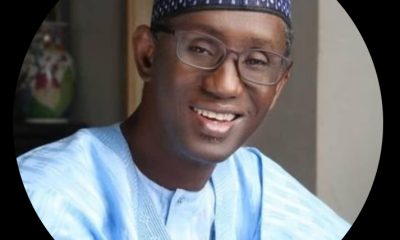
 News8 hours ago
News8 hours agoInsecurity: Criminals Cart Away NSA Ribadu’s Office Hilux During Juma’at Prayer In Abuja
-

 News17 hours ago
News17 hours agoSad! Explosion rocks Lagos
-
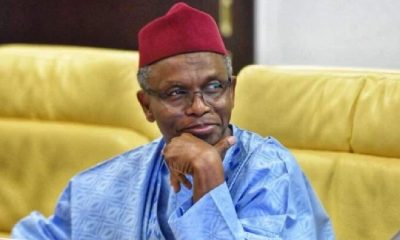
 News17 hours ago
News17 hours agoWe only had lunch with Buhari not 2027 politics -El-Rufai
-
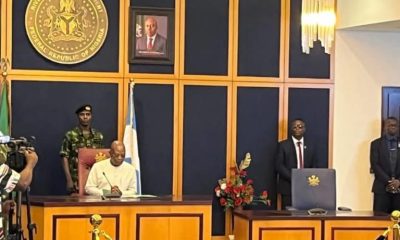
 News16 hours ago
News16 hours agoIbas gives reasons why Sole Administrators were appointed for Rivers councils
-

 News17 hours ago
News17 hours agoParts of Abuja, Niger in total darkness -AEDC confirms
-
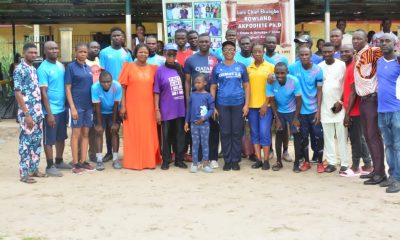
 News11 hours ago
News11 hours agoOERAF Rounds Up Late Chief Ekuogbe Rowland Akpodiete’s remembrance with Novelty Match
-
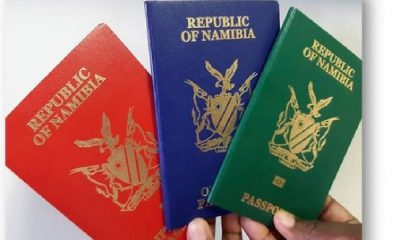
 News15 hours ago
News15 hours agoFive countries with easy work visas in 2025
-

 News15 hours ago
News15 hours agoUS embassy announces new requirements for visa interviews for Nigerian applicants


















